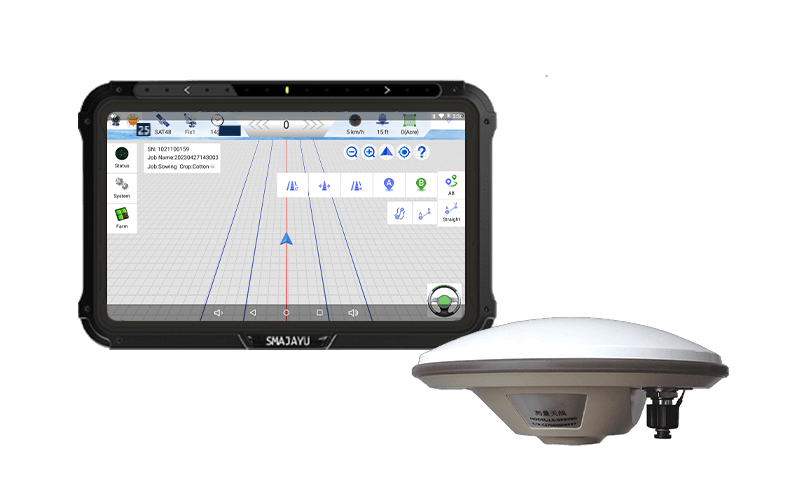What does Tractor GPS mean?
A GPS known as tractor GPS is one that was created especially for use in agricultural tractors and other farm equipment. A satellite-based navigation system called GPS offers accurate information on location and placement. Tractor GPS systems use this technology to boost agricultural operations and increase efficiency. Typical tractor GPS systems include a GPS receiver mounted on the tractor and connecting with satellites to pinpoint the tractor's precise location.
The most practical and economical approach to increase the productivity of your farming operations is with a tractor GPS. From a single dashboard, you can follow the position of your tractor, keep an eye on its operation, and even spot issues before they arise.
What makes SMAJAYU's tractor GPS apart from competing products?
The farmers' efforts to greatly increase our supply are appreciated by us. We have spent most of the last twelve years working on creating precision farming instruments that might help all farmers reduce the labour they must perform, increase the revenue they receive from their properties, and widen their horizons. A crucial instrument for implementing precision farming methods is the Global Positioning System (GPS). Farming equipment, including field sensors, tractor auto steering, agro drones, and farm mapping software, would only be as helpful to farmers with GPS. Using GPS systems in tractors for farming may lead to higher yields, lower costs, and less time spent performing manual work; however, this will only be the case if your GPS devices are as precise as they can be.
Strategies for increasing GPS accuracy:
In the following sentences, we'll look into several tactics for raising the precision of agricultural GPS antennae. Before examining strategies to increase location precision using GPS, it is crucial first to identify the problems that potentially restrict GPS location accuracy. Some of the most frequent causes of GPS accuracy problems include the following:
- You are advised to use a global positioning system (GPS) agricultural system to monitor your tractor's movements. A field efficiency of 100% is still feasible to obtain.
- Having a GPS system for a tractor may help you in a variety of ways when it comes to managing the day-to-day aspects of farming.
- With this technology, you can navigate in the dark, keep track of locations, make notes, and use simple navigation techniques.
- The great majority of farmers are happy to employ GPS devices since they enable them to increase their revenue.
- Farmers may exert the least labour while seeing the most return on their time.
The Future of Agriculture with GPS Tractor:
The future of farming is undoubtedly being significantly influenced by tractor GPS (Global Positioning System) technology. With the development of precision agriculture, GPS-enabled tractors provide a variety of advantages to farmers, boosting production, efficiency, and sustainability in the agricultural sector. The following are some crucial characteristics of how tractor for GPS is changing agriculture:

- Precision farming:
GPS enables accurate location and field navigation. Farmers are able to optimize inputs like fertilizers, herbicides, and irrigation by creating computerized maps of their farms. Farmers may cut waste, lessen their impact on the environment, and increase crop yields by carefully applying these inputs just where they are required.
- Automated guiding:
GPS technology makes it possible for tractors to have automated guiding systems, which do away with the need for manual steering. Farmers may use program tractors to follow predetermined pathways with extreme precision by using precise positioning. Due to the increased efficiency of field activities like planting, spraying, and harvesting, time and labour costs are reduced.
- Variable Rate Application:
Tractor GPS enables variable rate application, in which inputs are applied at various rates depending on particular field circumstances. Farmers may construct prescription maps that direct the tractor to alter input applications in real time by analyzing data obtained from GPS and other sensors. This skill optimizes resource use, lowers prices, and has a minimal negative impact on the environment.
- Data gathering and analysis:
Field conditions, operations, and yields are all subject to a wealth of data produced by GPS systems in tractors. This data may be gathered, saved, and analyzed to get important insights into crop production, soil health, and general farm management. Farmers may enhance production and make educated judgments for the future by utilizing this data to drive their actions.
- Farm Management and Connectivity:
GPS tractors may be incorporated into farm management software to help farmers track and manage their activities more efficiently. Tractors, agricultural machinery, and central management systems may all be connected in real time for seamless monitoring, task distribution, and communication. This connectedness encourages efficient processes, lowers downtime, and raises overall agricultural output.
- Agricultural that is autonomous and intelligent:
Tractor GPS is the first step in the creation of autonomous agricultural systems. GPS-enabled tractors may be combined with other technologies like computer vision, machine learning, and sensor networks, thanks to artificial intelligence and robotics developments. These developments make it possible for autonomous tractors to make judgments in real-time, monitor crops, and carry out duties with little assistance from humans.
Conclusion:
The most practical and economical approach to increase the productivity of your farming operations is with a tractor GPS. From a single dashboard, you can follow the position of your tractor, keep an eye on its operation, and even spot issues before they arise. To help you with various issues, SMAJAYU offers both basic support services and online technical support and a thorough and reliable service. It is made to make it easier for tractors to stay up to modern developments and performance requirements. Individuals on our technical team have an average of more than ten years of expertise. You will experience better because of our highly developed technology capabilities, innovative concepts, and responsible and trustworthy team members.


